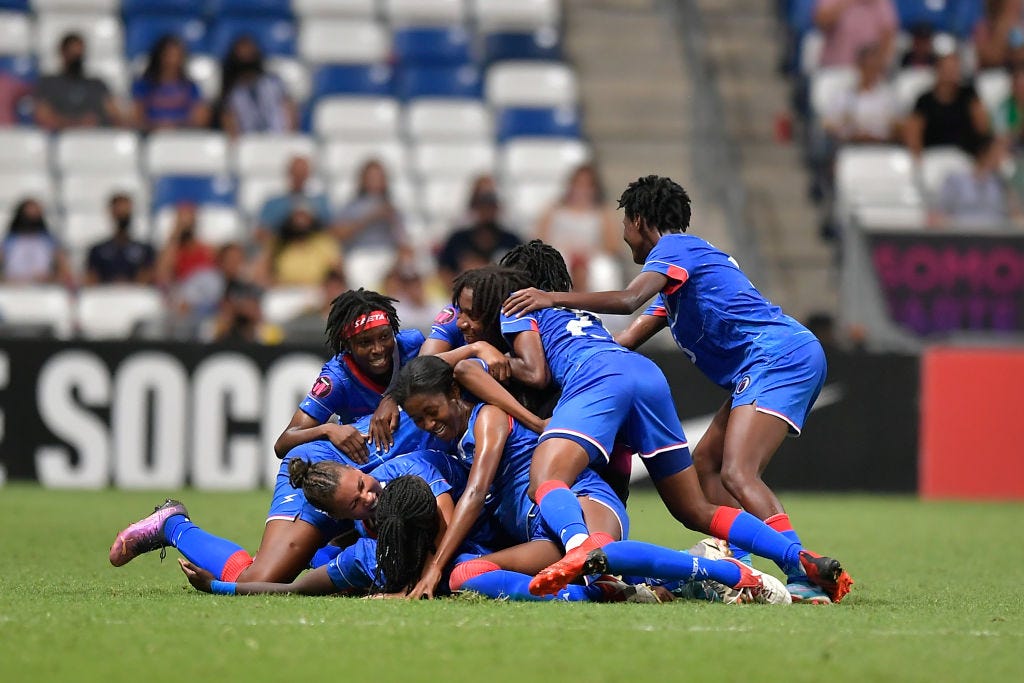Premium: Haiti's Harrowing Journey Might Still Include the World Cup
A shocking sexual abuse scandal led to Haiti's federation president being banned for life. But people close to the case say FIFA isn't doing nearly enough.

MONTERREY, Mexico — Haiti is still alive for World Cup 2023. And Mexico, the host country for the CONCACAF World Cup qualifying tournament, a nation that expected to reach Australia/New Zealand next year, is not.
“FIFA has essentially washed its hands of this and is not protecting the whistleblowers and survivors in the way that they promised they would.” — Minky Worden, Human Rights Watch
The USWNT clinching a berth in the World Cup may have drawn the most attention back in the States, but the stories of the tournament so far have been Haiti and Mexico. And while Haiti lost 4-0 to Jamaica on Monday night, its stunning 3-0 win over Mexico in the previous game gave Haiti enough points to finish third in Group A and qualify for the World Cup intercontinental playoff in New Zealand next February.
GrantWahl.com is a reader-supported soccer newsletter. Quality journalism requires resources. The best way to support me and my work is by taking out a paid subscription now. Free 7-day trials are available.
Melchie Dumornay, Haiti’s electric 19-year-old forward, has been a constant threat in this tournament, and she’s drawing widespread attention from NWSL teams that want to sign her. But if there was one person who isn’t surprised that Haiti still has a decent shot to qualify for its first women’s World Cup, it was Shek Borkowski, who coached the team from 2012 to ’17.
“If you look at the progress of [Haiti’s] youth teams between 2012 and now, you see the U-15s have consistently finished in the top four in CONCACAF, and the U-17s have finished top four in CONCACAF,” Borkowski told me from Puerto Rico, where he’s coaching these days. “And of course, the U-20s qualified for the last U-20 World Cup. I kind of expected the U-20s would continue their development, especially now that 10 or 11 of them are playing in France. So they train consistently in good environments.”
“And Dumornay, I brought in in 2016 to play with our U-15 team when she was 12 years old,” he continued. “She was spectacular. I mean, you could see at age 12 playing against 15-year-old U.S. players, she held her own without any problems.”
As you watched the Haitians celebrate their best moments here, you couldn’t help but contemplate the unspeakable horrors that the players in that country have endured in recent years. As Jonas Baer-Hoffmann, the general secretary of FIFPro, the global players union, told me Monday, “It’s the perfect example of a team performing despite their federation, not because of or thanks to or supported by. I mean, it’s unbelievable that this team got itself to that stage.”

In November 2020, FIFA banned Haitian federation president Yves Jean-Bart for life from all soccer activities and fined him $1 million after groundbreaking investigations from The Guardian, FIFPro and Human Rights Watch revealed that Jean-Bart and Haitian soccer officials had perpetrated a horrific culture of sexual abuse, including the rape of minors and forced abortions, at the Zurich-funded FIFA Goal Center development facility in the country.
FIFA’s 45-page report, which goes into excruciating and necessary detail on the testimony of survivors and whistleblowers, makes for harrowing reading.
The report concludes: “Based on the above analysis, the panel determines that Mr. Jean-Bart abused his position as the most senior official in Haitian football, as president of the FHF (for 20 years) and created a very complex and extremely harmful system of sexual abuse and exploitation of female players, also minors of age, which occurred inside and outside of the Center and shattered the lives and careers of young girls coming from vulnerable backgrounds with their passion of playing football and possibly pursuing a football career. By doing this, Mr. Jean-Bart also betrayed Haitian football as well as the fundamental values of the game and of FIFA. He became an absolute ruler of an organization, irreversibly corrupting his presidential mandate as custodian of the football youth in his country.”
Jean-Bart, who has maintained his innocence, has filed an appeal with the Court of Arbitration for Sport that is ongoing, and he testified before CAS in April. The Haitian court system, which is notoriously corrupt, has cleared him of criminal wrongdoing to this point. Jean-Bart did not respond to a message sent to him.
“Conservatively, hundreds of [Haitian] women and girls on the national teams in the academy, which is called the Ranch, and men and boys were abused, and I have interviewed dozens of them,” Minky Worden, the Director of Global Initiatives for Human Rights Watch, told me in an interview Sunday. “The heroes here are the whistleblowers and survivors who came forward with evidence, and FIFPro, which provided pro bono legal support. Survivors were able to give the evidence to FIFPro, which would anonymize it.”

But Worden, Baer-Hoffmann and Romain Molina, one of the authors of the stories in The Guardian, were adamant in interviews with me that FIFA:
• Has not done enough to ban other Haitian federation officials who were involved in sexual abuse and who still work in the federation and with the Haitian women’s national team.
• Has not prevented Jean-Bart from continuing to exercise significant influence on Haitian soccer and the federation.
• Has not attempted to collect the $1 million fine that it issued Jean-Bart.
“It’s unimaginable what FIFA is doing,” Molina told me. “They didn't clean up the mess at all.”
“FIFA has essentially washed its hands of this,” Worden said, “and is not protecting the whistleblowers and survivors in the way that they promised they would. FIFA so-called ‘normalized’ the federation, but I can tell you that they have left Jean-Bart cronies and abusers in place. It’s not fair to the incredibly talented and hardworking women and girls of the Haitian national teams that they should have to play in the shadow of this unresolved horror show.”
“The people who are still running the [Haitian] federation in many respects stand credibly accused of sexual abuse or knowing about it and doing nothing,” Worden went on. “The worst reports that Human Rights Watch has are from female players on the national team who said that sexual abuse was everywhere. It was on the medical staff. Everyone saw it and did nothing. A lot of the people who are still there may not have participated in sexual abuse, but they certainly knew about it and did nothing to protect the children.”
A spokesperson for FIFA responded: “FIFA strongly rejects those comments as we have shown that there is a zero-tolerance policy for cases of sexual abuse, exploitation and harassment in football.”
The spokesperson added: “Besides the ethics investigations and sanctions, a normalization committee has been appointed at the Haitian federation (FHF) and the entire executive committee dismissed, since the failures in governance structures that have facilitated the abuse of power are severe and deeply rooted and a lengthy reform process of the FHF is now also needed. The normalization committee is fully dedicated to creating a safeguarding culture within the Haitian federation. To this effect, a safeguarding officer was recently appointed at the FHF, mandated to act as a focal point for future safeguarding concerns and to support the development of a safeguarding policy and procedures.”
While everyone I talked to for this story was thrilled for the Haitian team’s success here, they all are fearful about the continuing climate around the case inside Haiti. Threats of reprisals to players who speak out about what happened are ongoing, they say.
“The situation obviously is still far far from resolved,” FIFPro’s Baer-Hoffmann told me. “It was always clear to us from the beginning that unless you are able to create real, substantial culture change and really remove everybody who was involved in this kind of systematic abuse system, that you run a high risk of it coming back. We're still very concerned.”
Last week, however, came news that brought them some hope. On July 6, Evans Lescouflair, the former sports minister of Haiti, was arrested in Puerto Rico by Interpol and brought to Haiti, where he has been accused of rape and sexual abuse.
“It’s an amazing victory,” Molina said. “So I give hope that one day Jean-Bart will finish his life behind bars.”
“It ought to put the fear in everyone who supported Jean-Bart and did not help those children,” Worden told me. “There’s reason to think that all of the shoes have not dropped in Haiti.”





Incredible. But why am I not surprised? Why am I not surprised that FIFA, as usual, has done so little?
I’m left to wonder how common other stories like this are, all over the world. If the NWSL can look the other way at abuse happening HERE, how bad must it be elsewhere? And I’m sure the abuse we’ve heard about here is only the tiny tip of a very large iceberg. We’d be shocked at how rampant it truly is.
Thanks, Grant. I was rooting for Haiti last night, because that whole country just needs something positive to happen. But it sounds like the team just ran out of gas.